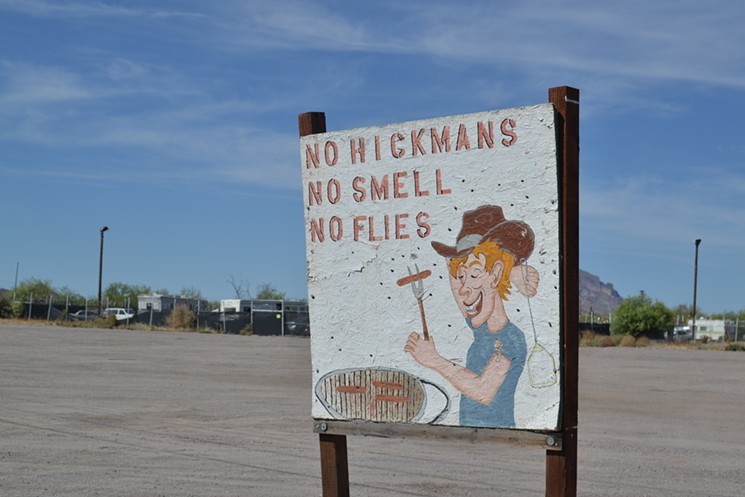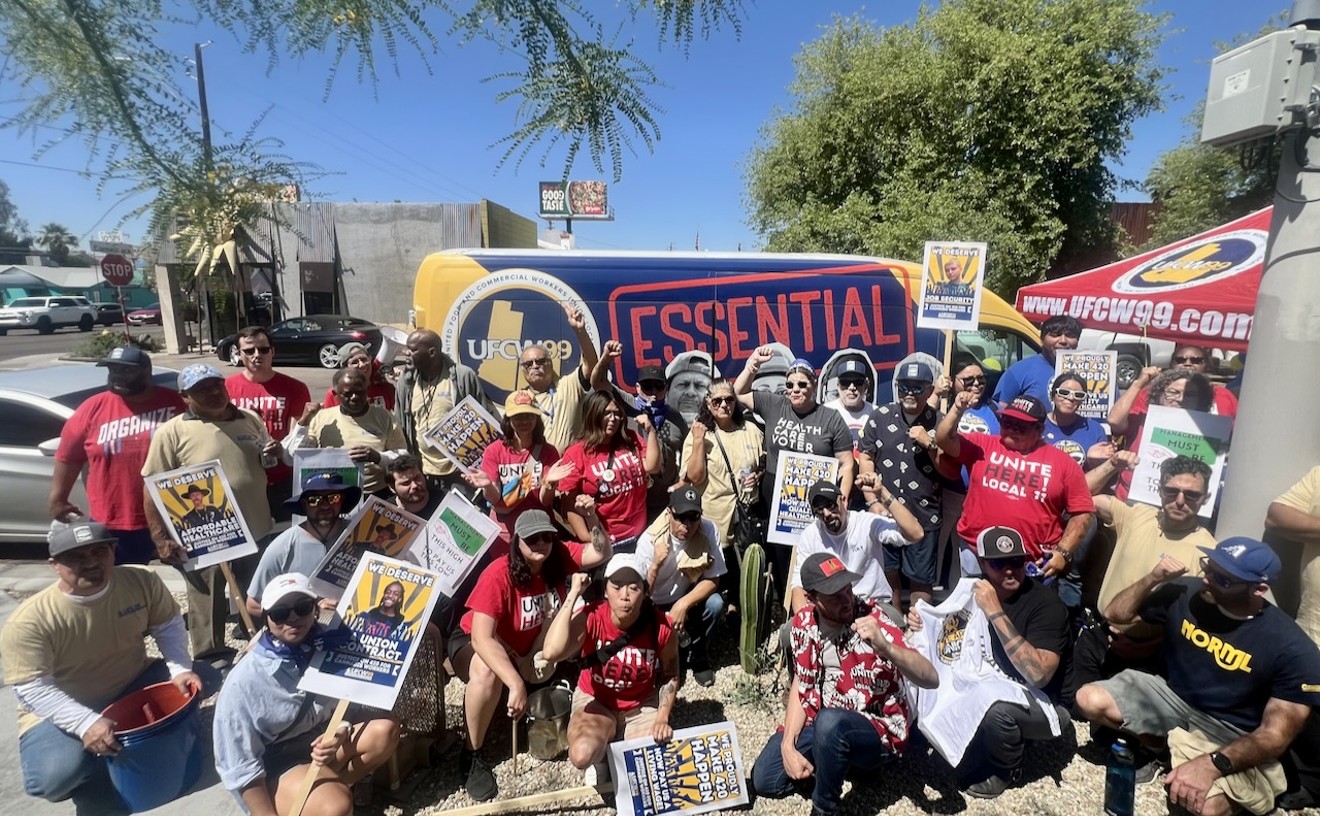For a small staff, the news team at Phoenix New Times gets big results. From running sexual predators out of town, to getting accused pedophiles out of office, to sparking a series of government investigations into corrupt companies putting people's health at risk, here are 10 stories that brought changes to the community this year.
1. Exposing Bill Tonnesen's Sexual Misconduct:
Stories of local artist Bill Tonnesen sexually abusing women had been shared among people in the Phoenix arts scene for a while, but it took New Times fellow Hannah Critchfield speaking to 15 people about Tonnesen's disturbing transgressions to put the spotlight on him. Since then, Tonnesen's art installation, The Lavatory, has permanently closed, and Tonnesen has disappeared from the public eye (including a rumored brief stint fleeing town). More women have come forward about their own experiences with Tonnesen, and three of the women who spoke with Critchfield have since filed police reports against Tonnesen. Tempe Police reopened a fourth report that they'd recommended sexual abuse charges for. It previously had been dismissed by the county attorney's office because, they said, there was "no reasonable likelihood of conviction."
2. Getting the ADOC to investigate food labeled "not for human consumption:"
In September, New Times staff writer Elizabeth Whitman broke a series of nauseating stories on people inside Perryville prison seeing food labeled "not for human consumption." The packages came from ADOC contractor Trinity Services Group, whose food provided to prisons across the United States has sparked riots and was alleged to sometimes contain mold and maggots. The Arizona Department of Corrections inspector general has since launched an investigation into the mystery meat.
3. Uncovering Arizona State Representative David Stringer's shady past, forcing him to resign:
Stringer was charged with multiple sexual offenses, including child pornography, when he lived in Baltimore in 1983, according to records uncovered by New Times staff writer Steven Hsieh and freelance writer Lawrence Lanahan. A microfilm copy of his case history obtained from the Circuit Court for Baltimore City shows that Stringer was indicted on five sex offenses on October 10, 1983. That record appears to show a Maryland court entered a judgment of guilt for Stringer on three sex offenses. The case history also shows that he was sentenced to five years of probation in the case, and was ordered to seek treatment at a well-known clinic for people with sexual disorders. Stringer resigned from office on two months later after refusing to cooperate with an ethics investigation into sex crime charges.
4. Getting a food bank for HIV patients to rework its policies:
After New Times fellow Ali Swenson contacted the Joshua Tree Feeding Program about a patron who said he received moldy, expired food, an official with the food bank (which serves HIV and AIDS patients) said the facility would re-examine its policies and procedures. The food bank, which has served Maricopa County's low-income, HIV-positive population since 1988, discussed fixing the issue at a meeting earlier this month.
5. Holding Phoenix police accountable:
In June, New Times staff writer Meg O'Connor was the first to report on how a database of disturbing social media posts by police included those made by nearly 100 Phoenix police officers, prompting an internal investigation into the department that eventually led to the firing of one officer and the discipline of several others. About a week later, New Times was the first to report on a video of a Phoenix police officer pulling a gun on an unarmed black man, Dravon Ames, and threatening to shoot him in the head in front of his pregnant fiancée and children. The video went viral, drew nationwide scrutiny to the department, and led to packed community meetings and demands for a civilian review board. The officer who held Ames at gunpoint, Christopher Meyer, was fired months later. Two other officers whose alleged misconduct was covered extensively by O'Connor — Beau Jones and Marcos Rodriguez — were also fired this year. Jones is currently under criminal investigation for reasons that have yet to be revealed, while Rodriguez was accused of stalking a woman and holding her at gunpoint.
6. Getting a QAnon professor fired:
"Who is Q?" Mesa Community College English professor Douglas Belmore asked reporter Steven Hsieh when Hsiesh contacted the professor about allegations he had kicked off the fall semester by showing his class a 14-minute YouTube video about QAnon (a conspiracy theory that believes a cabal of satanic, cannibalistic pedophiles has infiltrated the American government, media, and entertainment industry). The college fired Belmore after Hsieh asked about him, stating that Belmore's services "were no longer needed."
7. Sparking a temporary ban on utility companies cutting off electricity in the summer:
In June, Elizabeth Whitman chronicled the tragic tale of Stephanie Pullman, who died in her home after Arizona Public Service cutoff her electricity on a 107-degree day because she owed them roughly $50. The widely read story prompted the Arizona Corporation Commission to vote unanimously to prohibit power companies from disconnecting electricity to residential customers during the often-scorching weeks of June 1 through October 15. Regulators are still working on the permanent rule.
8. Changing Department of Economic Security policy after reporting on the agency's bedbug plague:
This fall, New Times fellow Hannah Critchfield got saddled with a beat truly no one wants: bedbugs. After first reporting that the DES office on 115th Avenue and Bell Road was infested with bedbugs, Critchfield followed up on the situation as things reached a point that employees described as a “pressure cooker” atmosphere. Staff members endured psychological turmoil and risked spreading the outbreak to their developmentally disabled clients. Her reporting led the DES office to close temporarily while the situation was resolved. But even after the office reopened 10 days later, employees simply walked in and found new bedbugs. The infestation even spread to another DES office. It all led the DES to adopt a bedbug protocol, though its efficacy remains to be seen.
9. Forcing the Arizona Daily Star to republish an op-ed it initially deleted out of fear of Sheila Polk:
In June, the Daily Star published an opinion piece by Pima County Public Defender Joel Feinman about how Arizona prosecutors keep killing criminal justice reform bills. But once Yavapai County Attorney Sheila Polk called to complain, opinion editor Sarah Gassen immediately deleted the piece, without even bothering to check whether Polk's complaints about the piece were accurate (they weren't). After New Times reporter Meg O'Connor contacted Gassen about the op-ed, the Daily Star republished the piece.
10: Prompting the state's Occupational Safety and Health office to investigate Hickman's egg farm:
After New Times staff writer Elizabeth Whitman reported that a barely trained inmate at Hickman's egg farm had lost a finger, the "family farm" blamed the woman for her own disfigurement. But the Arizona Division of OSHA decided to initiate an inspection "based on the incident described in [New Times'] story." Whitman covered other problems with Hickman's: how other inmate workers were injured; how the company flew drones over Tonopah to spy on residents suing the company; and how the smell of chicken poop coming from Hickman's massive barns in Tonopah is sickening residents and causing the small town to collapse.
[
{
"name": "Air - MediumRectangle - Inline Content - Mobile Display Size",
"component": "18478561",
"insertPoint": "2",
"requiredCountToDisplay": "2"
},{
"name": "Editor Picks",
"component": "16759093",
"insertPoint": "4",
"requiredCountToDisplay": "1"
},{
"name": "Inline Links",
"component": "17980324",
"insertPoint": "8th",
"startingPoint": 8,
"requiredCountToDisplay": "7",
"maxInsertions": 25
},{
"name": "Air - MediumRectangle - Combo - Inline Content",
"component": "16759092",
"insertPoint": "8th",
"startingPoint": 8,
"requiredCountToDisplay": "7",
"maxInsertions": 25
},{
"name": "Inline Links",
"component": "17980324",
"insertPoint": "8th",
"startingPoint": 12,
"requiredCountToDisplay": "11",
"maxInsertions": 24
},{
"name": "Air - Leaderboard Tower - Combo - Inline Content",
"component": "16759094",
"insertPoint": "8th",
"startingPoint": 12,
"requiredCountToDisplay": "11",
"maxInsertions": 24
}
]













